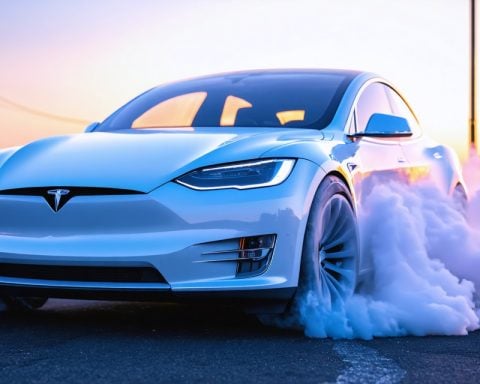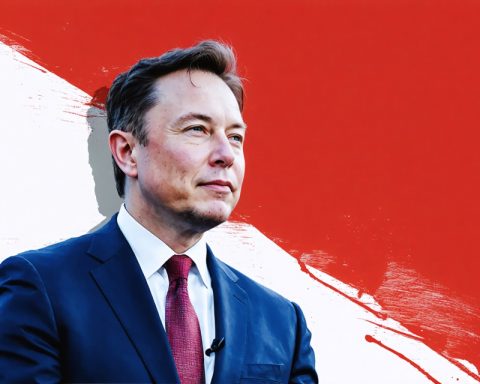- Jennifer Trebb’s initial excitement for her Tesla Model Y symbolized innovation and environmental responsibility.
- Discontent with Elon Musk’s political affiliations has led some Tesla owners, including Trebb, to switch back to gasoline vehicles.
- Musk’s perceived alignment with former President Trump’s policies has unsettled Tesla’s consumer base.
- European markets show decreased enthusiasm for Tesla as new electric competitors emerge.
- Tesla’s stock prices have fallen, causing investors and consumers to rethink their support.
- Physical protests at Tesla showrooms highlight the brand’s entanglement with personal and public ideology.
- Trebb’s switch to a Mercedes reflects a desire for personal values that diverge from Tesla’s current identity.
- The situation underscores the impact of corporate identities intertwined with divisive politics on consumer loyalty.
- In the electric age, consumer choices reflect not just product preference but alignment with personal principles.
Jennifer Trebb still remembers the exhilarating rush when she first brought her Tesla Model Y home. Gleaming under the sun, the electric vehicle symbolized a leap into the future — an embrace of innovation and environmental stewardship wrapped in one stylish package. It was a statement as much as it was a ride, embodying the dual promise of avant-garde technology and ecological responsibility.
Yet, today, Trebb’s Tesla adventure has taken an unexpected detour. Echoing a growing sentiment among some Tesla owners, she recently traded her high-tech chariot for the familiar growl of a gasoline-powered vehicle. The electric allure of Tesla is dimming, obscured by founder Elon Musk’s contentious political affiliations and his influential tremors throughout the federal landscape. His actions, seen by many as aligning with former President Trump’s policies, have rippled through Tesla’s customer base, unsettling those whose values sharply diverge from Musk’s public persona.
This unrest isn’t isolated to corners of America’s vast highways. Across the Atlantic, Tesla has faced headwinds with Europe’s once-enthusiastic market showing signs of cooling as new electric ventures blossom, eager to claim the crown from Musk. The sharp drop in stock prices has mirrored this turbulence, with investors and consumers alike reevaluating their commitments.
The company’s shifting fortunes have also sparked physical demonstrations, becoming symbols of larger sociopolitical divides. At Tesla showrooms, protesters voice their discontent, and incidents of harassment underscore how deeply Tesla’s corporate identity is interwoven with personal and public ideology.
Trebb recounts the pivotal moment at her local Kroger that solidified her decision to part ways with Tesla. Ridiculed and branded in the parking lot, she returned home, weary of the moral and social baggage now attached to what was once a purely aspirational purchase. Her transition from Tesla to Mercedes was less about vehicle preference and more a statement of personal values, a symbolic break from the polarization she felt had tainted the brand.
As Tesla trudges through these stormy times, the broader lesson becomes clear. Corporate identities interlaced with powerful figures and divisive politics can sway consumer loyalty, emphasizing that in today’s market, customers are buying more than just a product. They are investing in values they hope align with their own. In this electric age, the path to enlightenment isn’t just about cutting emissions; it’s also about illuminating the principles by which we drive forward.
Why the Tesla Hype is Slowing Down: Market Trends and Consumer Sentiments
Introduction
The allure of Tesla, once seen as the vanguard of automotive innovation, is experiencing turbulence. Behind the sleek design and cutting-edge technology, consumer sentiments are shifting, influenced by broader socio-political factors and emerging competition. Below, we explore the facets impacting Tesla’s market position and offer insights into the evolving landscape of electric vehicles (EVs).
Industry Trends and Market Forecasts
– Emergent Competition: Tesla is facing increased competition from other automakers venturing into the EV space. Brands like Volkswagen, Ford, and new entrants such as Rivian and Lucid Motors are introducing competitive models with similar or enhanced features.
Related link: Lucid Motors
– Regulatory Changes: International markets, particularly in Europe and China, are tightening emissions regulations, pushing traditional car manufacturers to accelerate their EV offerings. This could potentially dilute Tesla’s market share.
– Market Projections: The global electric vehicle market is predicted to grow significantly, with expected sales reaching nearly 30 million units by 2030, according to industry forecasts from the International Energy Agency.
How-To Steps & Life Hacks
– Transitioning from EVs to Gasoline Cars:
1. Research Vehicle Options: Review features, fuel efficiency, and environmental impact.
2. Evaluate Financial Implications: Consider resale value, fuel costs, and insurance.
3. Understand Maintenance Needs: Gasoline cars may require more frequent maintenance than EVs.
Features, Specs & Pricing
– Tesla Model Y Specs:
– Range: Up to 326 miles on a full charge.
– Top Speed: 135 mph.
– Pricing: Starting at approximately $54,990.
– Comparison with Mercedes EQC:
– Range: Approximately 220 miles.
– Top Speed: 112 mph.
– Pricing: Starting around $67,900.
Consumer Insights and Predictions
– Values-Driven Purchases: As evidenced by individuals like Jennifer Trebb, consumers are increasingly prioritizing personal values and corporate ethics in their purchasing decisions.
– Influence of Social Media: Public opinion, driven by platforms like Twitter and Facebook, can significantly impact brand perception and consumer behavior.
Controversies and Limitations
– Elon Musk’s Public Persona: The Tesla CEO’s outspoken political views have polarized consumers, leading some to sever ties with the brand.
– Challenges in Charging Infrastructure: Despite growth, EV charging infrastructure still lags in many regions, affecting convenience for Tesla owners.
Security & Sustainability
– Environmental Benefits of EVs: While EVs reduce emissions, the production and disposal of lithium-ion batteries pose environmental challenges.
– Sustainability Initiatives: Tesla continues to lead in sustainable manufacturing practices, including the Gigafactory’s focus on reducing carbon footprints.
Actionable Recommendations
– Explore Alternatives: Consumers considering a switch should test drive multiple EV models to experience different technologies.
– Stay Informed: Keep abreast of regulatory changes and incentives that may affect EV ownership.
– Evaluate Financial Incentives: Take advantage of available tax credits and rebates for purchasing EVs.
Conclusion
In an era where brand identity and consumer ethics converge ever more closely, Tesla’s journey underscores a broader shift in values across the automotive industry. As consumers reassess their loyalties, Tesla must navigate these socio-political currents while maintaining its technological edge. Consider the various factors at play, from emerging competitors to environmental impacts, when making informed automotive choices.



















